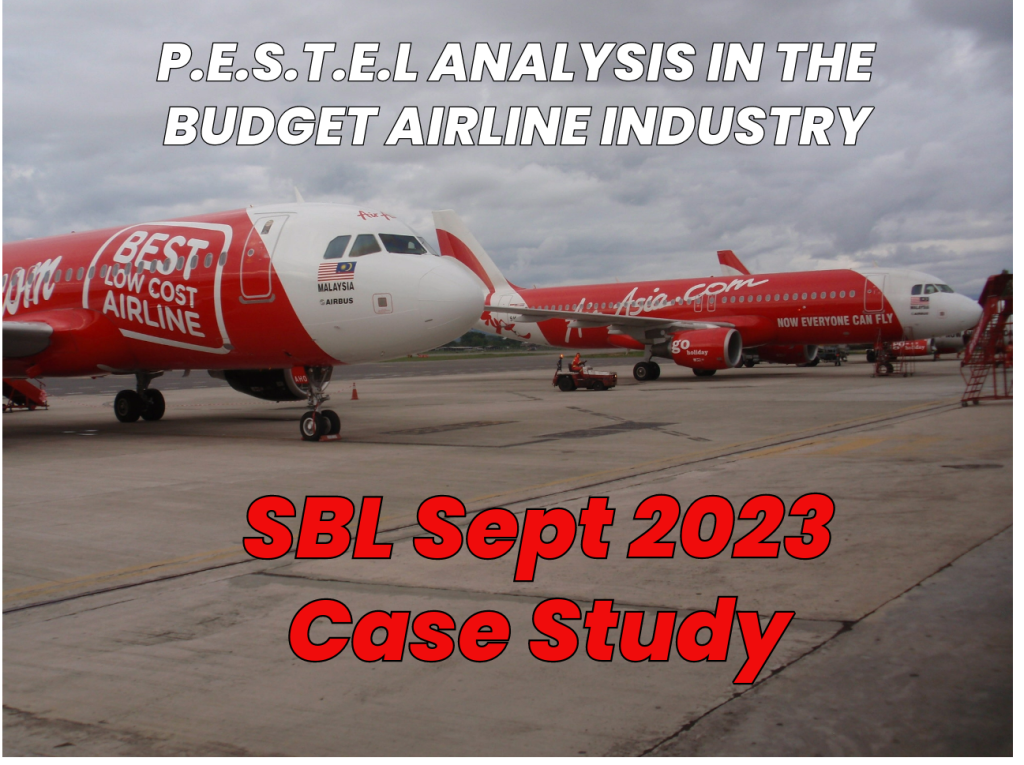
ACCA SBL in real life: PESTEL Analysis
The September 2023 SBL case study is based on the airline
industry so the examiner may draw some examples of real-life scenarios when
setting questions. The following article relates to a topic in the SBL exam
topic of Environmental Analysis, which
is a crucial element of the SBL syllabus and popular with the examiner.
I will offer a complimentary review of the Pre-Seen on
September 2nd at 2pm UK time, which will be 9pm Singapore time. Please note
tickets are strictly limited.
If you are sitting the exam, please sign up here
https://www.eventbrite.com/e/706213984037?aff=oddtdtcreator
Navigating the UK Budget Airline Industry with PESTEL
Analysis: Insights for SBL ACCA students
Introduction
Aspiring ACCA professionals must embrace strategic tools
pivotal to business success. Among these, PESTEL analysis shines as a robust framework
for assessing external macro-environmental factors. In this article, we will
delve into PESTEL’s application within the UK budget airline industry, with a
focus on the upmarket segment. Real-world examples, including those tied to
social media, demographic trends, inflation, environmental concerns, legal
factors, technology, and economic factors like fuel costs, will illuminate its
significance. We will also explore its relevance to the Strategic Business
Leader exam case study.
Decoding PESTEL Analysis
PESTEL analysis dissects six pivotal dimensions – Political,
Economic, Social, Technological, Environmental, and Legal – to discern the
forces shaping a business’s landscape and strategy.
Applying PESTEL in the UK Budget Airline Industry
1. Political Factors:
Political factors exert substantial influence on budget
airlines. Air Passenger Duty (APD) in the UK is a clear example of government
policy affecting the industry. APD is a tax levied on flights departing from
the UK, with rates varying based on factors such as distance travelled and
class of travel. Changes in APD rates can directly impact airlines’ financial
health and customer demand. Additionally, government policies related to travel
restrictions, airport security, and international agreements can significantly
affect the operations and profitability of budget airlines. As an additional
example, government subsidies or incentives for environmentally friendly
practices can shape budget airlines’ strategies.
2. Economic Factors:
Economic variables sway budget airlines’ fortunes. Economic
conditions like inflation directly affect operational costs and pricing
strategies. Notably, fuel costs significantly impact budget airlines’ financial
health. Fluctuations in oil prices can lead to volatile operational expenses
and affect profitability. Furthermore, economic trends can lead to shifts in
consumer preferences. For instance, during economic downturns, travellers might
seek more affordable travel options, increasing the demand for budget airlines.
3. Social Factors:
The upmarket budget airline segment reflects shifting
societal preferences. The surge in “leisure” travel prompted airlines
to enhance services for business travellers, including Wi-Fi connectivity and
tailored seating. Moreover, social media’s influence shapes travellers’
expectations and experiences. Platforms like TikTok have become influential in
customer behaviour. Viral videos showcasing travel experiences can spark
interest and influence purchasing decisions, especially among the younger
demographic. Additionally, evolving family structures can lead to more solo
travel, impacting airlines’ service offerings.
4. Technological Factors:
Technological advancements dictate customer experiences.
Biometric facial recognition at UK airports streamlines boarding processes,
catering to the fast-paced nature of budget airline passengers. Additionally,
technology plays a significant role in allowing budget airlines to save costs.
Automated check-in systems, online booking platforms, and self-service kiosks
minimize staffing requirements and operational inefficiencies, contributing to
streamlined operations and reduced expenses. Advances in aircraft design and
efficiency also impact budget airlines’ decisions on fleet upgrades.
5. Environmental Factors:
Environmental awareness drives industry change. UK budget
airlines prioritize sustainability, with initiatives like EasyJet’s carbon
neutrality commitment and partnership with Airbus for electric aircraft
development. For instance, Ryanair’s efforts to reduce emissions by
implementing more fuel-efficient aircraft showcase the sector’s environmental
initiatives. Another example is the development of biofuels that can
significantly reduce the aviation industry’s carbon footprint.
6. Legal Factors:
Legal considerations mould operational strategies. The UK’s
EU exit necessitated aviation regulation adjustments, impacting licensing and
operations. Airlines adapted to new international flight procedures, requiring
business model modifications. Moreover, health and safety issues are paramount.
Airlines must comply with stringent safety protocols to ensure passenger and
employee well-being. This includes implementing social distancing, sanitation,
and health screenings. Additionally, evolving data protection regulations can
impact airlines’ handling of customer data for marketing purposes.
Relevance to the Strategic Business Leader Exam Case Study
In the Strategic Business Leader exam case study, budget
airlines’ pursuit of the upmarket segment is a common scenario. PESTEL analysis
empowers candidates to gauge external impacts. Imagine an airline introducing
luxury amenities. Economic conditions (affordability), technological
innovations (cost-saving technologies), social media trends (customer
engagement), demographic shifts (solo female travellers), environmental factors
(carbon neutrality), inflation, legal considerations (data protection),
economic factors (fuel costs), and legal factors (health and safety compliance)
shape the strategic choices.
Conclusion
Proficiency in tools like PESTEL analysis equips ACCA
aspirants with strategic insights. The UK budget airline sector’s adaptability
underscores its relevance. Concrete examples illustrate how political,
economic, social, technological, environmental, and legal facets influence
strategies. Embrace these insights to excel in ACCA examinations and shape
financial landscapes. Remember, strategic thinking propels success,
particularly in the dynamic realm of budget airlines.